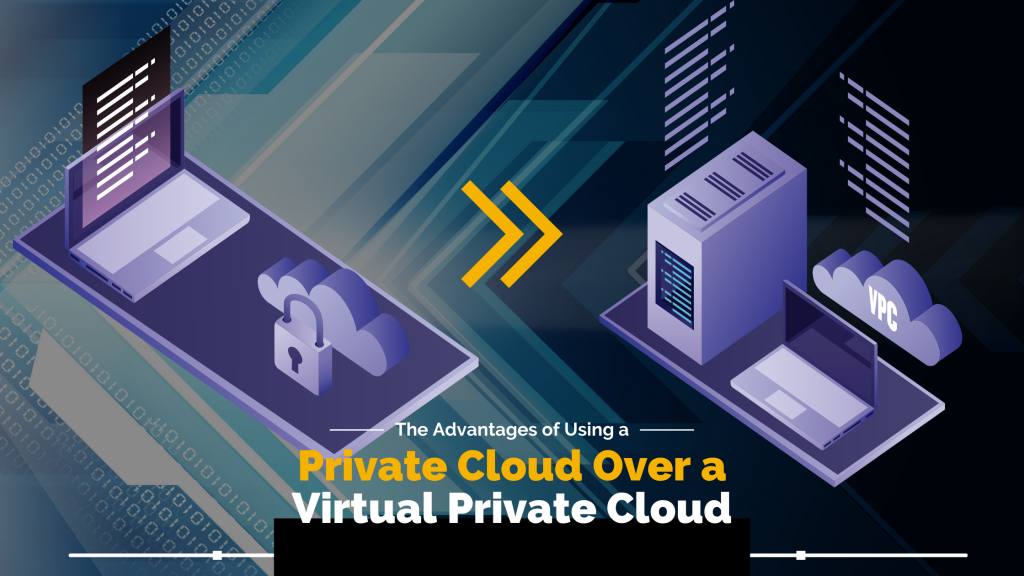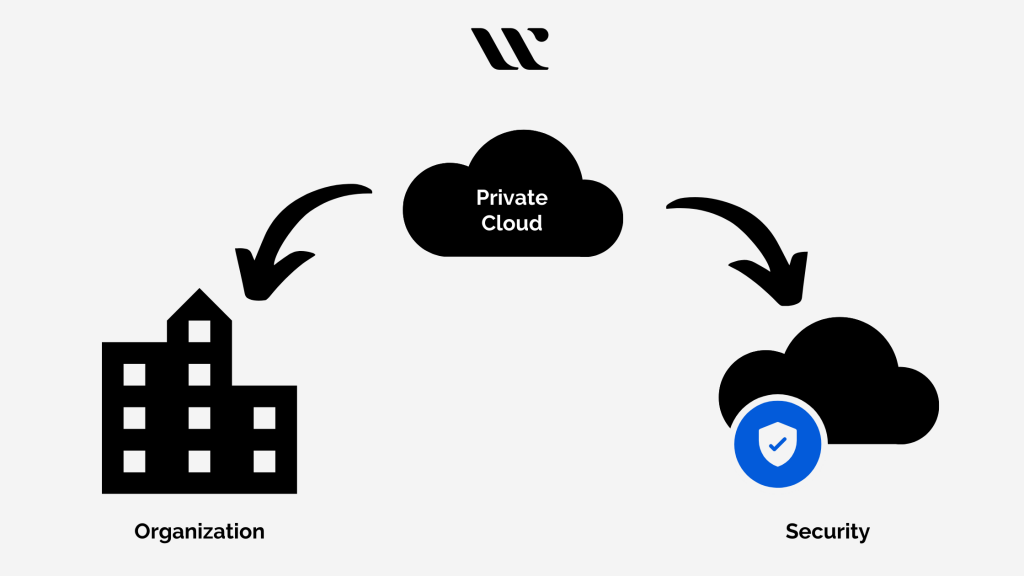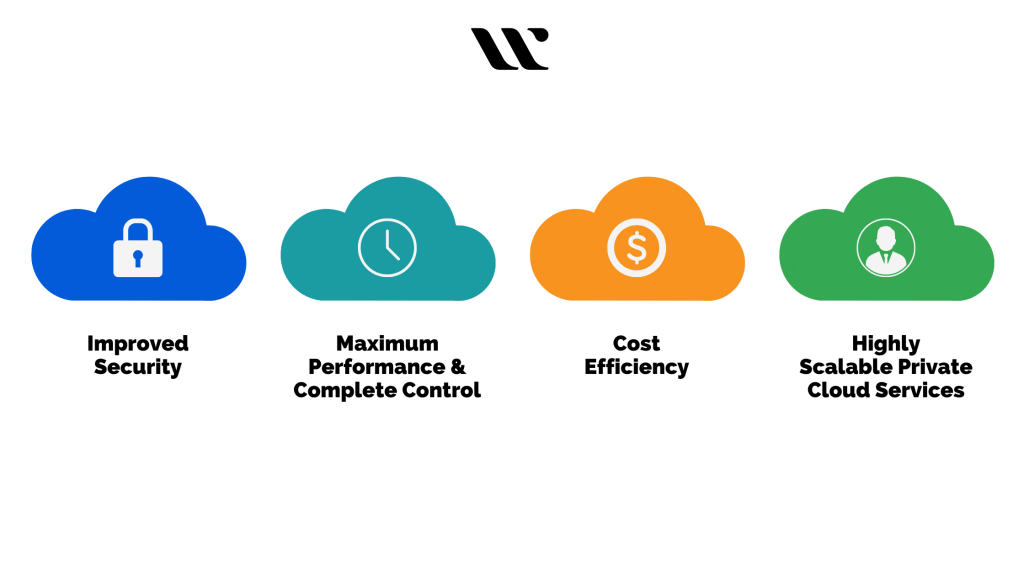After virtualization became a trend across business enterprises, the Cloud took over to adapt this ideology to give businesses its parallel perks. The use cases of Cloud embedded with virtualization have grown over the past few years and are still booming in the present era.
But, with the boom of virtual private Cloud, people have not forgotten the efficacy of a private cloud for serving specific purposes. The Private Cloud is a single cloud environment that is dedicated to run on individual infrastructure. It usually functions with off-site data centers or is carried out by managed private cloud service providers on the premises.
The reason why people still prefer private Cloud over the public and virtual Cloud is for its exclusivity and control. You do not have to share the hosted resources with anyone but keep it only to yourself. Hence, this article intends to give you a brief clarity on the differences and advantages of using the private Cloud over Virtual Private Cloud.
Definition of a Private Cloud
Private Clouds were primarily introduced to eradicate the drawbacks of the public Cloud. As the name suggests, it intends to put in more privacy than public clouds. With the isolation experienced with the private Cloud, the users are open to adding superior customizations, thereby ensuring reliability. As per privacy is concerned, the security levels are also high with private clouds.
A Private Cloud is an infrastructure that is dedicated to only one organization. People often confuse it with virtual Cloud, but the true aspects are quite varying in both of these services. The sole purpose of a private cloud is that it allows the users to house the crucial data of one dedicated organization exclusively.
Check out Whizlabs Cloud Certification Training Courses. Learn and get certified!
People also confuse private Cloud with the internal hardware that they equip for data storage within their enterprises, but it is not entirely the case! The organizations need to purchase the infrastructure, install the necessary software and hire a management team for carrying out the private cloud services all on their own. If not that, the enterprises can also get the private cloud equipment essentials within their premises while housing them at the data center associated with the providers.
With it, the enterprises intend to achieve all the possible economic benefits. The enterprises get access to internet connectivity, power, fire protection, prevention from malware threats or theft. Therefore, a private cloud can be managed by an organization itself or can be handed over to third-party providers.
Virtual Cloud has benefits over the private Cloud as virtually you can seek more storage without modifying the hardware. But, there are still some instances that prove the might of the private Cloud over the virtual Cloud.
Why is Private Cloud Better than Virtual Private Cloud?
Before you can follow on to know the differences between these two based upon their advantages, it is important for you to get an idea about why the private Cloud is better in comparison with VPC. Even though there are numerous perks being highlighted by the providers over the internet for VPC over the private Cloud, certain facts define its high proximity over VPC.
Virtual Private Clouds are meant to fill the gap between public & private clouds. But, VPC intends to serve SAP workloads that are not destined to scale or move like others, for which the enterprises need to think long-term plans of picking the proper cloud infrastructure. By picking up a private cloud, you get a more comprehensive level of service.
Alone with a proficient service level, you also get high-end performance and data isolation with the implementation of a private cloud. Moreover, the security aspects are also considered with the inclusion of private cloud infrastructure. Virtual Private Cloud allows you to choose the location of your data with the support of a hybrid cloud. But, VPCs, in some instances, go through over-provisioning, which triggers isolation of the resource pool for enhancing the allocation aspects. Even though it is beneficial, it will cost you more than that of your contract.
Check out 40+ Best Performing Free Tests from Whizlabs today!
Therefore, it is important to have transparency with the cloud provider or have enough knowledge of the infrastructure to ensure that you are paying only for the resources or services that you need. The managed private cloud infrastructure is meant to be delivered with exact specifications as imposed by the users to seek better control, feel and look upon the on-premises solutions. With it, the journey towards implementing the private cloud infrastructure becomes more fruitful for the IT executives.
Here are some of the negatives of virtual private Cloud that are quite important considerations for people to pick private Cloud as their prime option. Some of the cons of virtual private Cloud are:
- The cost of operating with VPC is comparatively higher than any other cloud hosting solution.
- You need to pay the additional cost for the ingress & egress moving in and out of data within VPC.
- Time delay is a possible issue for users who are integrating VPC with open internet via a private connection. The dependent factors for this are the type of encryption and application complexity.
The Advantages of Using a Private Cloud Over a Virtual Private Cloud (VPC)
To help you get clarity on why a dedicated private cloud is better than that of a virtual private cloud, here are some of the practical advantages for private cloud infrastructure to enlighten you for the same:
- Private Cloud is designed to fit the economics, compliance, and application requirements of an enterprise.
- It is built with the implementation of enterprise-class technologies that are getting their power from Hyper-V or VMware.
- It allows the utilization of isolated computing to the fullest. Moreover, the single-tenant cloud environment is meant to perfect for HIPAA or PCI compliance aspects.
- Data storage options are embedded within the private Cloud for enhancing the performance of any application.
- It offers transparency within the core infrastructure technology. Along with that, it intends to help you with visibility in the internal work operations within the environment.
- The sizing of the application workloads has no restrictions as the private cloud infrastructure is custom-designed that is meant to perform specifically for a dedicated organization.
- It comes with off-site cloud backups and has managed and integrated DRaaS available within the infrastructure.
- It is embedded with SDN switching that results in quick, flexible, and convenient network management. You can also implement dedicated switching for complex configurations to meet the dedicated network requirements.
- Security services are also implemented within the private cloud infrastructure that helps with vulnerability scanning, log management, IPS/IDS, and others.
These are some of the advantages of private Cloud over virtual private Cloud that are to be considered on priority even in the present era when virtualization is taking a peak. Virtual infrastructure does provide ease to the functionality and operations within it, but the collective perks are less as compared to private Cloud. Therefore, it is important for you to pick the right option for your convenience of leveraging the Cloud for your business operations.
Best Performing AWS Free Tests
| Sl No | Certification | Questions | Rating | Link to the Test |
|---|---|---|---|---|
| 1 | AWS Certified Cloud Practitioner | 55 Practice Questions | 4.72 (29235) | Try Now |
| 2 | AWS Certified Solutions Architect Associate | 20 Practice Questions | 4.72 (93418) | Try Now |
| 3 | AWS Certified Developer Associate | 25 Practice Questions | 4.67 (29669) | Try Now |
| 4 | AWS Certified SysOps Administrator Associate | 20 Practice Questions | 4.69 (17143) | Try Now |
| 5 | AWS Certified Solutions Architect Professional | 15 Practice Questions | 4.71 (20740) | Try Now |
| 6 | AWS Certified DevOps Engineer Professional | 15 Practice Questions | 4.56 (10809) | Try Now |
| 7 | AWS Certified Advanced Networking – Specialty | 15 Practice Questions | 4.41 (3894) | Try Now |
| 8 | AWS Certified Security - Specialty | 15 Practice Questions | 4.49 (8650) | Try Now |
| 9 | AWS Certified Alexa Skill Builder - Specialty | 15 Practice Questions | 4.58 (972) | Try Now |
| 10 | AWS Certified Machine Learning - Specialty | 15 Practice Questions | 4.81 (3157) | Try Now |
| 11 | AWS Certified Database - Specialty | 15 Practice Questions | 4.67 (1005) | Try Now |
| 12 | AWS Certified Data Analytics - Specialty | 20 Practice Questions | 4.55 (2000) | Try Now |
Use Cases of Private Cloud & Virtual Private Cloud
For better clarity on the differentiation factor, here are the use cases of both private and virtual private Cloud.
Private Cloud:
The use of private Cloud is implemented on the below-mentioned scenarios:
- Security requirements
- Large scale applications that require high-end performance
- Legacy Applications that demand components for software licensing
- The complex network needs such as SDWAN, MPLS, and others.
- Development of disaster recovery cloud environment
- Creating and managing AI environments
- Embedded for infrastructure management needs.
Virtual Private Cloud
The use of virtual Cloud is implemented on the below-mentioned scenarios:
- Handling small or medium workloads that have simple network demands.
- Used with applications that have low RAM requirements.
- Used for increasing the capacity for special projects within a less span of time.
- Add on-demand resources for supporting the business cycle.
These are a few of the use cases that highlight the efficacy of both private Cloud and virtual private Cloud. All of the arguments stated above have given a clear insight that the private Cloud is better in all terms when compared to the public Cloud. But, when it is compared with virtual private Cloud, there are some important aspects where private Cloud takes a leading edge.
Read more on Virtual Private Cloud – A Guide
Both private and virtual private Cloud have their own pros and cons when compared to one another. It is solely upon the users and business owners to decide on their suitability before picking up one of these cloud solutions.
Final Verdict
This article has tried to give you a clear verdict on the efficacies of the private Cloud over VPC. But, considering the world-scale adaptations, both the cloud models have their own set of proficiencies, and you need to decide which one is better for your applications and operational workloads. You can take note of all other important factors associated with Virtual Private Cloud and Private Cloud to get better insight into what is best for you.
You can take the help of professional consultants as well to get a practical point-to-point consideration on which cloud infrastructure or model is better in terms of organizational integration. Based on the observations and conclusions that you acquire, pick the ideal one fit for your purpose.
- Top 20 Questions To Prepare For Certified Kubernetes Administrator Exam - August 16, 2024
- 10 AWS Services to Master for the AWS Developer Associate Exam - August 14, 2024
- Exam Tips for AWS Machine Learning Specialty Certification - August 7, 2024
- Best 15+ AWS Developer Associate hands-on labs in 2024 - July 24, 2024
- Containers vs Virtual Machines: Differences You Should Know - June 24, 2024
- Databricks Launched World’s Most Capable Large Language Model (LLM) - April 26, 2024
- What are the storage options available in Microsoft Azure? - March 14, 2024
- User’s Guide to Getting Started with Google Kubernetes Engine - March 1, 2024


